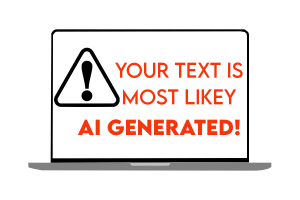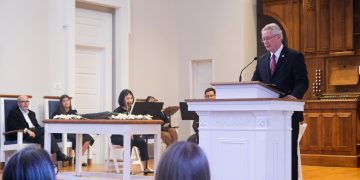
The artificial intelligence research company OpenAI released an in-development project called ChatGPT on Nov. 30, 2022, a few short weeks before many colleges across the country began final exams season.
Using ChatGPT, anyone can enter a prompt and create a well-formulated academic paper instantaneously. Websites will grant users a free trial or only charge money once a certain word count is exceeded. ChatGPT learns and improves itself every time someone uses it, so while some papers created by the AI in the early days after its release were flagged by plagiarism checkers, ChatGPT has improved with time, and now text it creates passes through conventional plagiarism checkers without raising alarm bells.
“I think both faculty and students can learn to use the large language model ethically. However, this will require educating ourselves about the limitations of this technology and respecting boundaries,” Marc Watkins, a lecturer in composition and rhetoric at UM, said.
College students across the nation are using ChatGPT to enhance the quality of their essays and homework.
One anonymous Ole Miss student who spoke with The Daily Mississippian considered using ChatGPT to write their final exams after a recommendation from a friend studying computer science, but eventually decided against it.
“I fell into a little depressive episode towards the end of last semester and it made it really difficult for me to get my schoolwork done. She told me that she had seen a TikTok of a student using ChatGPT to write all of their papers for school, so she suggested that I try it too,” the student said. “I thought ChatGPT sounded too good to be true, so as soon as I was done reading over the essay, I entered it into three different sites that check for plagiarism. It turns out I was right, because all three said that around 60-70% plagiarism was detected in my paper, so I ended up not submitting that one and just wrote the essay myself.”
Another anonymous student at Louisiana State University who spoke with The Daily Mississippian used ChatGPT to broaden an argument for a final exam essay. The student directly copied and pasted two paragraphs from ChatGPT and reframed the remainder of the essay around the arguments ChatGPT produced. The essay was awarded an A.
“In my eyes this could potentially be negative for students actually learning and retaining information, because everything can be done for them at the click of a button. On the other hand, though, it may just be the natural next step for things. It can also function as a streamlined version of Google and is fantastic for research. So it could be the catalyst for massive progress in the near future. It all depends on how people decide to use it,” the LSU student said.
ChatGPT’s uses are not limited to academic papers either: People have prompted the program to create original jokes, code computer programs and have conversations with historical figures like Jesus and Adolf Hitler.
Conversations are taking place at UM about how the use of AI will impact the university’s academic sphere.
“Educators across the country are currently exploring how AI writing tools might be useful for students, but large language models like ChatGPT are being deployed so rapidly that faculty have had little time to consider the impact of these tools on student learning,” Watkins said.
New York City schools have banned ChatGPT from school-issued technology. Universities in Australia have returned to pen-and-paper examinations in response. Many people believe the use of AI is academic dishonesty and will hinder the learning experience of students.
“Technology has opened all kinds of doors to us all, and with this development new ways to cheat on papers, commit plagiarism and essentially lie to one’s teachers and peers about one’s work and accomplishments,” Joseph Atkins, professor in UM’s School of Journalism and New Media said.
Atkins is concerned about the emergence of this technology and its growing popularity. In response to the effect of AI on an individual’s education, he questioned, “Who could take any pride in taking advantage of this to further one’s college career? How could you then look at your degree and consider it something you yourself achieved?”
There are some possible solutions for educators looking to curb the usage of ChatGPT in their classroom, however. Edward Tian, a Princeton University student, recently developed an app called GPTZero to detect whether text was written by an AI. While Tian admits that GPTZero is not yet 100% accurate at determining the originality of a given set of text, thousands of educators across the country have already begun using the app since its Jan. 2 release date.
ChatGPT is still being developed and is releasing in different iterations, and the current iteration ChatGPT-3 was trained on 175 billion different parameters. Alberto Romero, an AI analyst, speculates that ChatGPT-4 will be released soon and could be trained on as many as 100 trillion different parameters, which would make the language model far superior to the previous iteration and possibly much harder to distinguish from a human writer.
Due to the AI’s unique response features, text created by ChatGPT is often hard to detect as unoriginal. Despite this, Watkins urged students to exercise caution before using the model to do their homework.
“If I were a student, I’d be very cautious about using one at this time. Using AI to generate all of an essay is academically dishonest. At minimum, I’d speak to my professor to see if they will allow me to use the tool and under what conditions,” Watkins said.


























